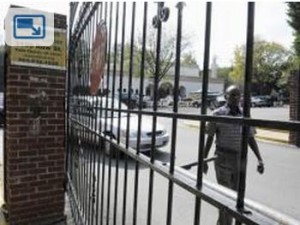At Islamic Center, Relief Awlaki Can No Longer ‘Spread Hate’
By Gary Strauss, USA TODAY
FALLS CHURCH, Va. – Members of the suburban, Washington D.C., Islamic center where Anwar al-Awlaki once served as Imam condemned his terrorist activities following his death Friday.
“Al-Awlaki encouraged impressionable American-Muslims to attack their own country,” said Imam Johari Abdul-Malik, director of outreach for Dar Al-Hijrah Islamic Center, where a large crowd was worshiping in morning prayer. “(He) will no longer spread his hate speech over the Internet to Muslim youth, provoking them to engage in violence against Americans.”
Al-Awlaki was killed by U.S. drone missile strikes in Yemen. His anti-U.S. rhetoric leanings led to his 2002 ouster at the center, where he served as Iman before 9/11.
The U.S.-born al-Awlaki was considered a key leader inspiring homegrown al-Qaeda attacks against Americans.President Obama, who ordered al-Awlaki targeted last year, called him the terrorist organization’s “leader of external operations.”
Al-Awlaki is believed to have helped plot the failed 2009Christmas Day bombing of a Detroit-bound airliner and a 2010 attempted car bombing in Times Square. He is also believed to have mentored Army Maj. Nidal Malik Hasan, charged in the 2009 shooting rampage that led to 13 deaths at Fort Hood, Texas.
Al-Awlaki’s English-language Internet sermons on jihad also had an impact on the radical Islamists implicated in a planned 2007 attack on military personnel at Fort Dix, N.J. One of the radical Islamists eventually convicted in the Dix case was recorded on a surveillance tape as being influenced by one of his lectures.
Ezeldin Diab, who prayed at the Hijrah Center on Friday morning, said al-Awlaki’s radical beliefs dishonored Islam.
“These kinds of people give a bad reputation for the rest of us,” says Diab, a 56-year-old commercial vendor who moved to the U.S. from Egypt in the early 1980s. “We do not believe in violence.”
Wadi Adam Lahrim, a 44-year-old consultant from Falls Church, says al- Awlaki’s death should close his still-perceived ties to the center, which hosts thousands of area Muslims in prayer and other activities.
“He’s history,” Lahrim says. “It was his decision to lead his life as as he did. His death shouldn’t come as a surprise. I’m glad we’re not going to have someone else with such excellent communication skills (sway) young Muslims.”
Reaction elsewhere was positive.
Ben Venzke of the intelligence monitoring firm Intel Center says al-Awlaki’s death crimps al-Qaeda’s ability to recruit and raise funds. His “influence and ability to connect to a broad demographic of potential supporters was unprecedented,” Venzke says.
“I think this is huge,” said retired congresswoman Jane Harman, the California Democrat who once served as ranking member of the House Intelligence Committee. “I’ve been calling Yemen ‘ground zero’ for a long time, and this guy is the bull’s-eye in ground zero. I don’t think there’s anybody with dirtier hands out there.”
In Beirut, Hazem al-Amine, author of The Lonely Salafist, said al-Awlaki’s death was a latest in a series of blows against an already weakened al-Qaeda, whose founder, Osama Bin Laden, was killed by U.S. forces in May.
Muslim associations condemned al Awlaki’s violent message but questioned the military strike.
The British-based Ramadhan Foundation suggested he should have been given due process.
“One of the greatest values of our countries is that every human being is entitled to a free and fair trial,” says Ramadhan Foundation CEO Mohammed Shafiq. “Terrorists and extremists are no different. These drone attacks have no legal justification in international law.”
Al-Awlaki was the first American placed on the government’s “kill or capture” list. At least twice, airstrikes were called in to Yemen on locations where al-Awlaki was believed to be.
Al-Awlaki’s father, Dr. Nasser al-Awlaki, had legally challenged the government’s authority to carry out the killing of a U.S. citizen outside a war zone. But in December, a federal judge dismissed a lawsuit filed by the American Civil Liberties Union and the Center for Constitutional Rights, which had argued that targeted killings were unconstititional.
Contributing: Carolyn Pesce, Donna Leinwand Leger, Marisol Bello, Mona Lami in Beirut and Associated Press.


















